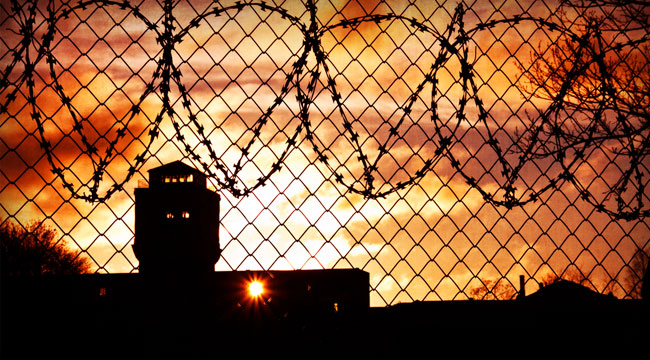The Secret Slave Labor Ring Coming to Your Neighborhood
Last night, a close friend and I watched a video titled “Mass Incarceration in the U.S.”
The figures were nothing less than shocking.
“America has about 4% of the world’s people,” Hank Green, the creator of the video began, “and about 25% of the world’s incarcerated people.
“We have the highest incarceration rate in the world,” he says as this graph pops up on the screen:
 More than North Korea!? Come on!
More than North Korea!? Come on!
There are about 2 million people in state, federal, and private prisons in the States. That’s 500,000 more than China.
And China’s population is five times greater.
The past few decades have seen a prison population explosion: We had fewer than 300,000 inmates in 1972. By 2000, that figure grew to 2 million.
Now, what he said next is pretty disturbing.
So much so, I did some deep digging to make sure he’s right…
And, he’s right.
“Forty-one percent of American juveniles and young adults have been arrested by the time they turn 23.
Forty-one percent.
That’s horrifying.
Worse, Green says, “Children as young as 13 years old have been sentenced to die in prison.”
“And,” he goes on, “our prisons violate international standards. Solitary confinement increases instability and violence in inmates and is considered by international law to be torture.
“But in America, it’s not regulated by anyone except the prison officials. No judge. No jury.
“Arguably, the most devastating form of punishment we enact in this country and yet there is no appeals process.”
“Punishment,” Green explains, “is only one piece of a much larger crime reduction pie.
“And it’s an expensive one, with some institutions paying more than $100,000 per year, per prisoner.”
Instead of efforts to rehabilitate and integrate criminals back into society, something really grim is happening…
“They don’t have to worry about strikes or paying unemployment insurance, vacations or comp time,” Vicky Pelaez wrote in Global Research.
“All of their workers are full-time, and never arrive late or are absent because of family problems; moreover, if they don’t like the pay of 25 cents an hour and refuse to work, they are locked up in isolation cells.”
“For the tycoons who have invested in the prison industry,” Pelaez writes, “it has been like finding a pot of gold.”
Ten years ago, you would’ve only found five private prisons in the country. And collectively, they held a population of 2,000.
Today, there are 100, with a population of 62,000.
Are privatized prisons to blame? Not exactly…
Because they’re not really private.
Government contracting, often lumped in with the “private sector” is anything but.
“It’s a grey netherworld,” says Nick Sorrentino on the Against Crony Capitalism blog, “part of the crony zone in the economy. Many contractors would not exist if it were not for government mandated rules and regulations. The ‘private’ prison industry operates in this twilight where taxpayers pay for profits.”
And it’s a vicious cycle.
Corporate stockholders use their connections to lobby for longer sentences and pettier laws to expand their workforce. They then pay them 24 cents to make everything from military equipment to Victoria’s Secret lingerie.
And if they don’t meet their sales quota? You pay for it. (More on that in a moment…)
The result? An overinflated industry that has trade shows… conventions… and mail-order catalogs…
All based on the assumption that the government will keep tightening the laws and the “criminals” will keep sliding in.
The Corrections Corporation of America (CCA) is the nation’s largest owner of private prisons. In the past two decades, revenue has climbed by more than 500%.
CCA is a $2 billion “private” company that’s 100% dependent on government contracts.
Forty-one percent of American juveniles and young adults have been arrested by the time they turn 23.
And it has big plans for the future: In 2012, CCA sent a letter to 48 governors offering to buy and run their prisons for 20 years.
Of many stipulations, one demanded the prisons maintain a 90% occupancy rate, regardless of crime rates. If they can’t maintain that rate, taxpayers would pay the penalty.
Yes, you pay the prison if your neighborhood becomes safer.
Shocking? It’s nothing new.
It’s actually a common industry practice.
A report from privatization accountability group In the Public Interest, reviewed 62 operating private prison contracts in the States.
They found that 41 of those stipulated that local or state governments were required to keep the facilities between 80-100% full.
All big private prison corporations attempt to push these requirements. And, most of the time, the governments placidly comply.
How do we fix it? It starts with our draconian drug laws.
Bad laws are filling prisons with non-violent citizens of the United States. People who would often otherwise abide the law and harm no one are being thrown into jail.
And they’re being exploited for what is essentially slave labor. By taking on a rational drug policy, we could cut the prison population in half… and stop Washington’s “private” slave labor ring.
Regards,
Chris Campbell
for The Daily Reckoning
Ed. Note: Government overreach doesn’t end there, of course. Far from it… The feds now have their hand in almost every aspect of your daily life, right down to the food you eat. But you don’t have to sit idly by and watch your freedoms disappear. There are a bunch of simple things you can do every day that can make a huge impact on your personal liberty. Readers of the FREE Laissez Faire Today e-letter receive several of these unique tips every single day… and they’re lives are much richer for it. Click here now to sign up for Laissez Faire Today, for FREE, to find out for yourself.






Comments: